Interview: October 14, 2001 for the "Elsewhere" Vangelis site.
Copyright (c) 2001 Dennis Lodewijks
"At one point I thought there were gonna be more people on stage than there were in the audience."

Introduction
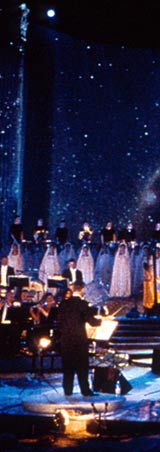
Picture the scene: a warm summer evening in Athens. Some 2500 lucky people sit packed on a temporarily raised seating construction in front of the Zeus temple ruins, in anxious anticipation of a night of musical genius. 30,000 others have come to satisfy their curiosity by packing around the free telecast screen at the nearby antique marble Olympic stadium. They are all about to witness the latest of Vangelis' rare concert appearances. But something is different from former occasions. For - when the audience finally detects some movement on the stage - it is not Vangelis appearing but a whole army of musicians and singers, taking their places at the dimly lit venue. A few minutes later the orchestra's soloists appear, followed by the conductor. Each of them greeted with a warm applause. Only then enters Vangelis, as he walks towards his cabin of synthesizers.
So, what happens if a veteran, but self-taught composer like Vangelis decides it's time to try recording and performing with a full and authentic philharmonic orchestra. He'll need to turn to someone experienced in the particular field, who can help translating his ideas first to paper, and then getting them performed by the musicians, in the exact way a Vangelis piece needs to be performed. So many others who have tried this with Vangelis' famous compositions have failed miserably. Even a legend like John Williams conducted "Conquest of Paradise" and "Chariots of Fire" orchestrally with questionable results at best.
And so it happened that on June 28 a young Texan named Blake Neely entered the stage, stood in front of 250 musicians and - following a nod from Vangelis - lead the whole caravan into motion for its hour and a half long musical journey.
The Mythodea project
It all started a year and a half earlier. "Well, Vangelis and I have a mutual friend, who had put me in touch with Vangelis. He (Vangelis) was looking for someone who would transcribe - which means would write down - all the music for orchestra. So I send him some demos of what I'd done before for other composers and different films and things. He liked what he heard and we got together in Athens. We met, we got along great and he asked if I wanted to do the project. That's how we ended up together."
The mutual friend in question is in fact a name famous for bridging rock and classical music, and scoring some of Hollywood's most successful films (Die Hard, Robin Hood, Highlander, Mr Holland's Opus): "I have worked for many years with a composer named Michael Kamen. He's friends with Vangelis and they had spoken and he gave him several references, and I just happened to get the project. It was wonderful!"
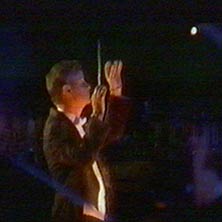
Was the work that you did for Michael Kamen similar to what you did for Vangelis? "Yes, 'orchestration and transcription' it is called." But finally you also conducted for Vangelis. "Right, which was marvelous. I was always supposed to be the rehearsal conductor at least. Then once we got involved in the project it just ended up that I guess I was the best person to do it. I knew the score so well, because I had transcribed it. So then I conducted the recording of the piece. And then as you know in June I was asked back to conduct the piece live."
Vangelis originally composed the piece - though orchestral in style - on his setup of synthesizers. How did he pass his ideas on to you? "What he did was, he...... Well, we're now all very familiar with his famous way of working in which he pretty much composes and he goes straight to tape. He composes in real time. So if a piece like Mythodea is about an hour long, it generally takes about an hour for him to compose it. I mean it really goes from his fingers straight to tape, you know what I mean?"
"So he gave me a recording of his work Mythodea. He had done this piece, as you know, back in 1993. So he gave me a recording of the performance which he did at the Herodium." Was this the original live recording or a studio recording? "Well, I don't know."
But it was all purely sound? No midi data, sequences or notes were exchanged? "No no, he doesn't do any sequencing. He just records it all onto tape. So I got a recording of that. Which, as you may have heard from '93, is a spectacular recording. It's just him, without an orchestra. So I got that, and, basically what I do is I listen to the recording and just write down all of the different orchestra parts. If I hear an oboe I write down what the oboe is playing, if I hear strings I write down what the strings are playing."
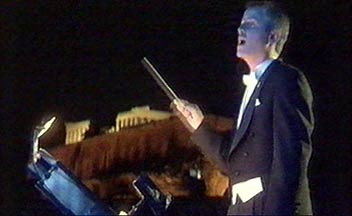
That would probably involve a certain degree of interpretation as well? "Well, yeah, there's some interpretation and there were lots of things that he wanted to change. Because the piece has lived inside him since 1993. There were things he wanted to expand, he wrote extra movements, as you know the piece is now eleven movements long." One extra. "Actually, he added 2 extra movements, he expanded a couple of movements. And then you know, while we were doing it I went back and forth to Athens from the United States and we would talk a lot and we had a long time that we worked on this. So he would say: "You know, I've just come up with another idea", so he would play that for me and we'd incorporate that into the score."
There's a few extra cues as well, in that sense. Like the horn part in the very long track (Album's track 5), there's one distinct melody that didn't appear in the original version. He would have written that? You didn't add anything yourself? "Yeah, he wrote it, and I just transcribed it and found a way to incorporate it."
And divide it over the parts, I suppose. "Yes, I mean, as you know with his system of playing with all the pedals - he has an elaborate pedal system - and can call up any sound as he's playing. So if he wants a horn to play a melody, he knows he wants a horn and it's not supposed to be a flute. So we'd talk about this, he would give me new recordings. It took a very long time, and many, many revisions later, we now have what is Mythodea."
Working from the recordings, writing out the music on paper, it must be a long way before you get to the recording part. Did you get any chance to test your work in between? "As an orchestrator it's frustrating because there is really no way you can test something that you're working on. You just have to know how it's going to sound by looking at the notes on the paper, by knowing about how orchestras sound. and you just have to know what it's going to sound like. So I wasn't able to test it until we actually got to recording it. With the orchestra. At that point you can still change things that might sound not like you thought they were going to. I'm always surprised by how something sounds that I've orchestrated. Most of the times it's very pleasantly surprised, and you think "Oh wow, that worked." but there are a few times that you think "Well, that didn't work" so you change it. There were times when Vangelis would say "Well that's not exactly how I want it, let's change it to this.""
Would your work also include the choir or just the orchestra itself? "Well, in '93 the choir parts were sung live, so those parts had been done before, written down. But then again he wanted to make many changes. He changed lyrics, he changed melodies... As you know from now listening to both recordings, they're quite different. It included the 25 drummers, they also had to have music. All of this was incorporated. It was definitely the largest orchestration I've ever done."
But you've done quite large projects, like Michael Kamen's "The Iron Giant". That's quite an elaborate work. "Oh yes, but the difference was that Vangelis had a 120 people in the choir, we had 75 in the orchestra, 25 percussionist, 2 sopranos. At one point I thought there were gonna be more people on stage than there were in the audience."
Lyrics
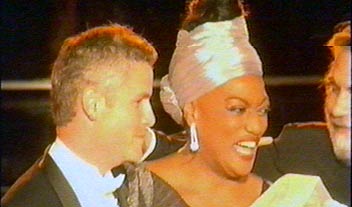
You mentioned lyrics: Are there actual lyrics, or is it word painting, as with many of his former vocalizations? "Uhm, they're not actual lyrics in the sense that they aren't a language." There are a lot of people who think they hear French and they think they hear Greek. They even hear the words "Mythodea" being sung everywhere. "Yeah, there's lots of things that sound like actual words, but I can tell you that you couldn't translate it. Vangelis and I both think it's funny that in years to come, there will probably be somebody somewhere who says: "Oh I know what this means" and will try to translate it... Vangelis knows what it means because he actually came up with the sounds. It's definitely not random. There's a lot of compositions where the composer will ask the singer to make their own sounds, but these were very specific. There were times when Vangelis would say "No, it's not 'Cah May', it's 'Vah Meh'", so he's very specific. But at the same time it doesn't mean anything... I'm sure it means something to him. And when you hear Kathleen Battle or Jessye Norman sing it, it really sounds like it means something. There are definitely places that I now have interpretations for just because I've listened and worked with the pieces so many times that after a while you think "Well, that's gotta mean this." All of us involved, including the listeners and yourself, will make a story for Mythodea in our heads." It's interactive? "Yeah, it's a very interactive piece. And we'll make some kind of story, and I think that's what his intention was. He did use the word Myth..."
I'm just curious, you didn't write out the soprano parts, right? "Everything that was played had to be notated. And those also changed a lot from the 1993 recordings." What I'm curious about is, how would he compose them. If he composes in one hour, and he plays all the instruments, how would he compose the soprano parts? "Well, I literally don't know how long it took him to compose Mythodea. I'm talking more about other pieces. Mythodea has taken a very long time for him to compose, because, he has his version in 1993, and now he has this version, and he has continually changed Mythodea since 1993 as you can tell from the 2 recordings. He would even change during the recording process with the two ladies, Mrs Norman and Mrs Battle. He was changing and altering and saying "You know, maybe this would be a nicer melody, let's change it to this". Which is great, because now he has the work that he envisioned. A lot of musicians, especially composers, sometimes don't have the luxury to change things until they get it right. Especially in the world of film music." That's because of a time limit, or? "Yeah, either that or you have to please a director or a producer. With this he was able to just please himself. Which is fantastic. The way all music should be composed."
Orchestras playing Vangelis
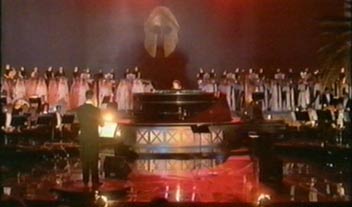
So you worked from the original recording, which was synthesizer based... "It was synthesizer and choir." Did you have at any moment the idea that maybe something shouldn't be translated or could not be translated to the orchestra because it was too electronic? Or maybe it just didn't fit in an orchestra? "Well, yeah, especially when you listen to the opening, the introduction, it definitely cannot be played by orchestra, that's him. That's him on his keyboards and his synthesizers making his special sounds. And there are lots of things that you'll hear throughout the work that are him. Because one of the things that he always insisted on was that this piece includes different sounds from the synthesizer. Those weren't notated, those were just him to play."
"So in years to come if you hear Mythodea played by the Berlin Philharmonic, it will sound like what you hear on the recording, but you won't get some of the space type sounds, or the analog synthesizer sounds. But there were also times where it did sound a lot like a synthesizer, but we decided to make it playable by an orchestra. So then what the key is, is to figure out what instruments in the orchestra we'll combine to make that sound. That's part of my job, to figure out what instruments I need to make it sound like that."
As you mention, other orchestras could play this. Vangelis said in a recent interview that one of the reasons that he wanted to do it with an orchestra this time - a real orchestra - was to be able to have the music played somewhere else without him going there. "Right, he said that many times." So that would mean that the music is published somewhere? That orchestras can get access to the music to perform? "Well, eventually... There's always legal things it has to go through, but I am sure that they'll eventually publish this music. The music does exist, we played it in June! With the orchestra. We have all the music available. At some point Vangelis hopefully will say: "Yes, I want other orchestras to play it". There have even been talks of sending Mythodea on tour. But not with Vangelis. Just have other orchestras play it, and even other sopranos singing. Although I can't imagine anyone but those two singing."
There've been many orchestral versions of Vangelis music, like for instance the Blade Runner orchestral version, these kinds of releases, but they never really sounded like Vangelis. This album really does sound like Vangelis. Part of that may be the mixing or sound production, but I'm sure it's also the playing, the performance? "Yeah, there's several things. One can be the orchestration. As we were talking about, the sounds that an orchestrator or transcriber chooses. You have to work right to make it sound that way. But part of it is the fact that Vangelis has his own unique sound. And you know when it's Vangelis, after this many years, you know exactly what it should sound like. And only he can do that. Some of that is through mixing, through the sounds he uses on the synthesizer, and some of it is just how he plays it."
I got the impression that the orchestra was actually trying to play like him this time. Successfully! "It's something that we worked at, Something that I have to work with him on as a conductor. To work with him on different styles of playing. Any musician can play the same musical notes hundreds of different ways. So as a conductor you work with the musician. We'd listen to his recordings sometimes, sometimes I'd just explain to them, and sometimes he'd explain to them." He was there? "Oh yes, he was there. There were times when he was explaining to the percussionist how to hit the drums. There are many ways to hit a drum, and how the Vangelis sound would be, would be like this. Hopefully we've gotten it. It does sound like Vangelis. I think the album sounds different in that you have a live orchestra but it's still very much the Vangelis sound." Definitely.
"Hopefully now that we have the Vangelis sound for orchestra, he and I will work together for many years as well. On new pieces."
Blake Neely
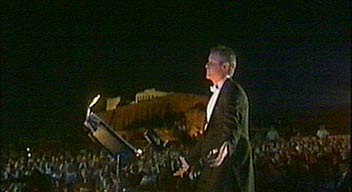
Blake Neely was born in Texas. He studied at the University of Texas, after which he moved to Los Angeles. He's married and has 2 children. His musical interest started very early on. "I've started playing the piano when I was 4 or 5 years old. I remember I became very fascinated with orchestra music at a very early age. My parents had these classical albums of Leonard Bernstein, back when we all had albums and not CDs or tapes. And I would listen to these a lot, over and over in my room. And then would go and without having the sheet music try to play these pieces on the piano. So it was sort of an early version of what I do now, which is listening to a piece and going and writing it down. And I just did this over and over and over. Until that's what I've decided that's what I want to do when I grow up."
And grow up he did, working with some of the world's best composers, orchestras,
musicians. Somehow though, he still found the time to write a whole series of
instruction books on how to play specific instruments, called "Fasttrack
Music instruction", including issues for drums, keyboard, lead singing, sax,
guitar and harmonica, as well as a book called "Piano for Dummies".
Neely: "Yeah, well, it's the job of an orchestrator to know how to play different
instruments. If you're going to ask a violinist to play something like "this",
you have to know, can they play it like that? You have to know which notes
they can play and which notes they can't play. I'm not good at playing many
instruments, I can play piano and I can play a few instruments. But what's
important is knowing
Did you learn how to use them by yourself? "Yeah, mostly by myself, through reading, through putting my hands on different instruments, through friends that played different instruments, using theirs.. So it's mostly self-taught, but I definitely did have classes and courses in college. And also throughout growing up."
You have orchestrated and you've conducted. Do you see yourself more as an orchestrator or a conductor? "I wouldn't be happy doing just one or just the other. I like both now. Especially if it's a piece like Mythodea that I've lived with for a long time and worked on for so long. It would actually be difficult to hand over to another conductor. Because you feel like: "I know exactly how it should be done." So hopefully there will be lots more work like that on both sides because I like to do it both."
Don't you ever get the urge to play yourself? To take the part of a performer and play, instead of him? "Well I've done that too, I've played piano. Sometimes. It's whatever is needed. There was a project I've worked on with Michael Kamen where I had to go play the bassdrum because we didn't have enough players. So, lots of different things. I write my own music, I like just about anything that has to do with music."
Working on Mythodea
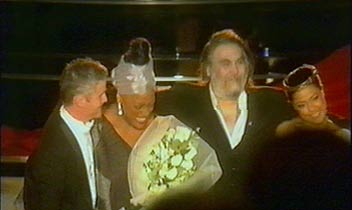
Isn't it a massive job, to do your work on one album like this all by yourself? "It was a massive job. Orchestrating was a massive job, conducting Mythodea was a massive job. I know that it looked like - well, I know you were there at the concert - and I'm sure it looked like I was just out there having fun, which it is supposed to look like, and we were having fun. But it's also a very difficult job. Everything about this piece was a massive job." You had the time for this. "That's part of my job. It's one of the things Vangelis said to me when we met and he offered me the job. He said "This is going to be a long process.", and I said "I want to do it!""
Where do you start on it? I mean, you have like an hour of music, everything is complex, or at least everything is a lot of work... "Well, the way I did it was I approached it in stages. I would work on a movement at a time. And you just decide "what do we attack first". My first attack, I think, was the 3rd Movement, the one that starts with the drumming. The first thing I did was transcribing the string parts."
"And we did have a time frame as well. It's funny, but after a while you just look back and you think "Wow, I'm almost halfway through." It's much like when you're recording a piece, and conducting, and you think "Oh my gosh, we're halfway through this".
"I remember at the concert, there was the big climactic point in the middle of Mythodea, where it turns into a huge crescendo of the drummers... When I got to that point during the concert, I thought "Oh my gosh, this is amazing, and I can't believe that we're halfway finished with this." It was almost sad, because you are having fun as a performer up there on stage. And it was also very rewarding that it was coming together so well, and that it was so loud, I loved it!"
"It was so loud it shook my entire body. I couldn't eat for a whole day."
That's partly mixed, isn't it? That's partly opening the volume sliders? "No, in fact, they probably had to mix it down. When we recorded it, it was so incredibly loud. And we recorded it many times. Because we wanted to get the best take possible, and I remember after... We're talking about the 4th movement right? [Note: CD track 5] The big percussion roll? I've always thought of it as the big middle point in Mythodea. You're timewise almost exactly in the middle of the piece. It's very well structured how he arrives at that point and in the last half he sort of brings you from that on down, which is great, like a dramatic climax. Anyway, when we recorded this we recorded again and again - I remember very distinctly and I told many people - that when we finally finished recording that crescendo with the 25 or 30 drummers and everyone, I came into the recording booth and Vangelis said: "Alright, lets take a break and have some dinner". And I said: "I can't eat." It was so loud and it shook my entire body, my stomach, everything was just shaking from how loud it was. I couldn't eat for a whole day. So no, that's not mixed, that's real."
The concert
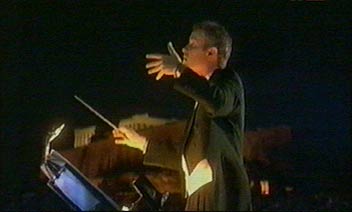
Were you nervous? There were 2500 people watching you, and 30,000 nearby watching the screen. "Uhm, nobody told me about the screen. I heard rumors of it. But I didn't know what it meant, I didn't know where it was gonna be. No one had told me about this. Perhaps if I knew there were 30,000 people in attendance just down the road, I would have been a lot more nervous. I was definitely nervous just with normal going on stage nervousness. But not nervous in that we wouldn't be successful. You have to understand also as you know, we rehearsed over and over. Like I was saying it was a massive job to conduct the piece. That includes the rehearsals. By the time we got to the 28th of June and it was time to go on and perform, there was no doubt on my mind that this would be a big success. We all knew the piece so well, it was almost, you know, I didn't have to be there." You were there just for show? "Yeah, I just showed up."
"Also we'd been working on the piece for so long, this was finally the moment that we were going to perform it live, And, the fortunate thing about being a conductor though, I will say, the most fortune thing is that your back is to the audience. "
"The best seat in the house!"
Actually you get to see some of the show behind it, don't you? "I had the very best seat in the entire house. I was standing right in the center, I could see everything, I could see the massive projections and the lights and the cameras. Even that night I could see Mars straight above. So I had a superb seat in the house. But what I didn't ever have to see was the audience. So after you begin performing as a conductor you forget that there's an audience behind you. I mean there's so many things that you have to think about, the last thing that you think about is: "Oh yeah, and there's 30,000 people.""
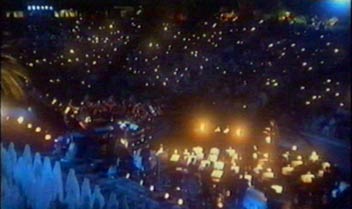
"Except when all of you turned on the lights during Chariots of Fire. I had to just turn around, while it was happening. Because it was an amazing sight." What happened was that everyone in the audience were given little flashlights upon entrance, and for most of the audience the recognizable tones of "Chariots of Fire" were a perfect moment to wave along with the music. The concert's lighting also changed as giant search lights joined the celebrations and transformed the atmosphere to a more frivolous affair.
The musicians
Did you work with the London Metropolitan Orchestra before? "Yes, I worked with them before, I'm friends with many people in the orchestra. I had not worked with the Greek national opera chorus. They were fabulous. I did have to - as you might guess - I did have to learn to speak Greek." You did??? "Oh yeah." Really? "Oh yeah. I kept telling everybody I'm not very good at it, but I had to learn to speak Greek. No one ever asked me to, but I realized that if I was going to be conducting.... And you have to remember that the drummers were all Greek and the choir was all Greek. A lot of them speak English, but it just made things a lot faster if I could say, instead of "Let's start at measure 1:57" The more I got used to the language the more fun it became to work with the choir. We would sometimes speak in Greek together and other times they would say "Your Greek is terrible, speak in English"." (laughs).
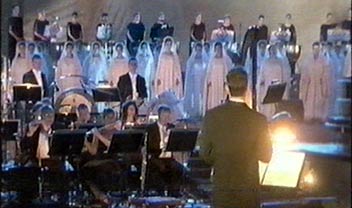
"They were great to work with, fantastic singers, as you heard. The drummers were amazing. The two harp players - they were not part of the LMO - they were both Rumanian, living in Athens. And they were wonderful to work with. At one point he had talked about having six harps..."
"There were people from all over the world brought together for this project. The film crew were from everywhere. From London, from Ireland, Scotland, United States. His engineers are French, Frederick and Philippe. There were people from all over the world on this project. That's what's great about music. It just all comes together."
Projects
You also worked on the Metallica album, I'd say that's a sign of versatility. "Yeah, that was a completely different type of music." The album in question is "S&M", last year's Metallica album where the hardrock band rerecorded their most famous tracks together with indeed a symphony orchestra. Both Neely and Kamen were attached to the project.
Was it different to work on it? Or is it basically the same just making music? "No it's very different, but it's still all about making music. I'm very serious when I say that the music of Metallica or the music of Vangelis or Michael Kamen or Beethoven, each project should be looked at differently and approached differently, but it's all music. I very much believe that, because I think that there are many people who think one type of music is more important than another. And I think all music is important in whatever form it comes."
What are you working on at the moment? "Right now, I've just been working on an album of my own that I'm going to be recording. I don't have a title yet, it's not one long piece, it's many pieces."
"I'm also working on some different projects with other composers: Graeme Revell, Michael Kamen, Paul Hasslinger." Haslinger is a veteran from the German school of electronic music, having pioneered with Tangerine Dream and regularly gaining success with solo work as well. Recently he worked with Graeme Revell on the soundtrack for "Red Planet". Since Vangelis and Haslinger are both pioneers, would you say Haslinger is different from Vangelis? "Of course he's different as a composer: He composes differently. he writes different types of music, and he also works differently. He uses computers much more than Vangelis does." Did it make a difference for you? "No. It's all music."
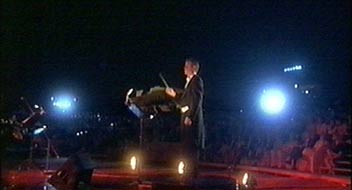
Your own album, is that a separate project? Not a film score or commissioned work? "I've been very influenced also by the composers I work with. It doesn't sound like Vangelis, it doesn't sound like Kamen, it doesn't sound like... Hopefully it sounds like myself. But it's not attached to any type of project, this is something that as a composer and a musician I wanted to do myself and put out as well."
"It's not my Mythodea, not one big work. I would describe mine as more Arvo Pärt meets Massive Attack - lush orchestral sounds with heavy drum loops and effects. But it's also very cinematic or film score-like, only without the film. It's a hybrid of orchestral, vocal and electronic."
With Graeme Revell, Neely has recently worked on the combined electronic and orchestral score for Tomb Raider (the popular computer game's feature film starring Angelina Jolie) as well as on "Collateral Damage" starring Arnold Schwarzenegger, a film whose release has been postponed after the September 11 attacks. They also worked together with Emma Shapplin (A French singer, world star since her success with the "Spente Le Stelle" hitsingle) on songs for her upcoming album.
"And hopefully Vangelis will move on to the next project soon. I know he's got lots of ideas as he always will have. So I'm eager to go back and start on something new with him. But I think Mythodea took so much out of him that he needs a break. He needs the rest." But you can go on. "I can go on... Yeah!"
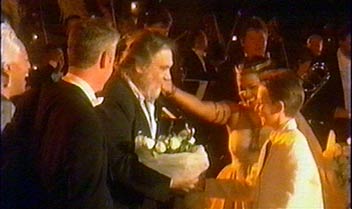
Interview by Dennis Lodewijks.
Special thanks to Blake Neely.
Additional thanks to Sufian
and Ivar de Vries.

